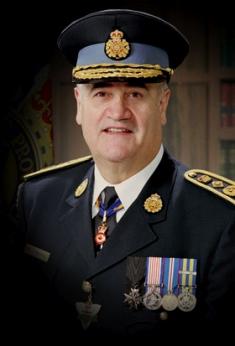Julian Fantino has struck again. On March 10, in a massive press conference from OPP headquarters broadcast live on many local TV stations, the OPP commissioner, now in his fourth year as Ontario’s top cop, sat amongst dozens of police brass to announce a province-wide kiddie porn bust.
It was “a massive, coordinated” police operation involving many police forces across the province and resulting in 122 charges against 35 men and teens.
The language echoed a similar Fantino-chaired OPP press conference 13 months earlier, when 31 men were arrested in what Fantino then called the “largest bust for child porn in Ontario history.”
And it was very similar to the press conference of February 2008, when 22 men and one woman were charged with child porn offences. After three high-profile busts over the last two years, very few cases have actually gone to court. When they have, they have received scant media attention. It is the difference between individual cases heard in court and highly orchestrated, scripted, televised police press conferences after charging a large group. Why does the media cover these charges so prominently, naming names, without any analysis or follow-up?
Mark Bourrie, an Ottawa historian and an expert on media and censorship issues, says this is typical of the Fantino machine.
“Fantino is a tireless self-promoter,” he says. “He always leaves the impression these charges involve seven-year-old kids exploited by Mafialike porn-makers.
“Of course, no one in the media says, ‘boo.’ They don’t want to be tagged as defenders of child molesters, and Fantino’s version of reality makes for another great menace storyline.”
Rob Teixeira, a doctoral student researching sexual regulation, agrees. “It’s interesting that many [in the public] are taken in as soon as they read ‘kiddie porn’ in the press. Critical thinking is shut down, and the media report the police perspective almost exclusively.”
Fantino dramatically announced on March 10 — as he did a year earlier — that he would “not rest” until he had “hunted down all the child predators” out there. This personal pledge has been picked up by many TV stations and some newspapers as “news” several times over the years.
In the current bust, the accused men are mostly accused of internet child porn possession or distribution. Police call this charge “make available,” but the police promotion machine sees no difference between creating kiddie porn and having it on your computer.
The men were from 16 cities across the province, including Ottawa, where five were arrested. All 35 men were charged with what Fantino apocalyptically called “one of the most heinous crimes that human beings can inflict on each other.”
Curiously, charges of “sexual assault” appear in much of the press coverage but not in the OPP official list of charges to date. And pointedly, Fantino and the other police brass present gave no specific details of the alleged crimes, the ages or even the sexes of the “victims,” or how the police became aware of those charged, or anything else upon which an independent analysis or assessment could be made. One has to take it on faith, as the mainstream media did, that the cops had broken up a huge kiddie porn operation and that the accused were all child abusers.
Surprisingly, most of the 32 formally charged were young people themselves. Nine are teenagers aged 15 to 19 (five are 17 or under); 10 are in their 20s (five of these between 21 and 23). Just six of the men were 36 or older.
This may be because the younger generation live much of their lives online, and many casually exchange photos all the time, Teixeira notes.
“Child porn offences can be incurred by anyone as easily as clicking on the wrong link. That is considered ‘possessing.’ Teens can be charged with these offences just for taking images of themselves and sending them to other teens. In that case, they can be charged with making, possessing and distributing. Teens are indeed being arrested under this law.”
This has been Fantino’s modus operandi since his days as the London, Ontario, police chief from 1991 to 1998. There he targeted gay men in “Project Guardian” for involvement in what he called — in highly publicized press conferences — a province-wide “kiddie porn ring.”
It was later shown to involve people who mostly didn’t know each other, teenaged hustlers and their older johns.
Only two were eventually convicted of pornography offences. But by 1994, Fantino had persuaded the then-NDP provincial government to provide London police with funding for a province-wide police program attacking the perceived growing threat of kiddie porn rings. Richard Hudler, a longtime gay activist who closely watched Fantino’s anti-child-porn crusade in the ‘90s, sees reason for hope this time around, as Fantino did not target any particular group — like gay men.
“I’m a little encouraged to see that they don’t appear to be creating as much moral panic as previously. My hope is that the public is starting to realize that the hype attached to these massive numbers of charges is exaggerated,” says Hudler.
Of course, Fantino isn’t the only one in the OPP prone to overstatement. Fred Goldschmidt, the officer in charge of the special child porn section of the OPP, said that one computer seized had six million child porn images on it. This amazing number was particularly hard to believe — who would look at, let alone count, six million photos? And if they haven’t looked at all the images, how can they tell they are porn, let alone child porn?
As the individual cases work their way through the courts, a more measured picture is likely to emerge. Following the last three mega-sweeps, there is usually no media exposure when charges are dropped, plea-bargained or prosecuted in the courts. And in the meantime, more than two dozen men have been named and shamed in their local newspapers.

 Why you can trust Xtra
Why you can trust Xtra


